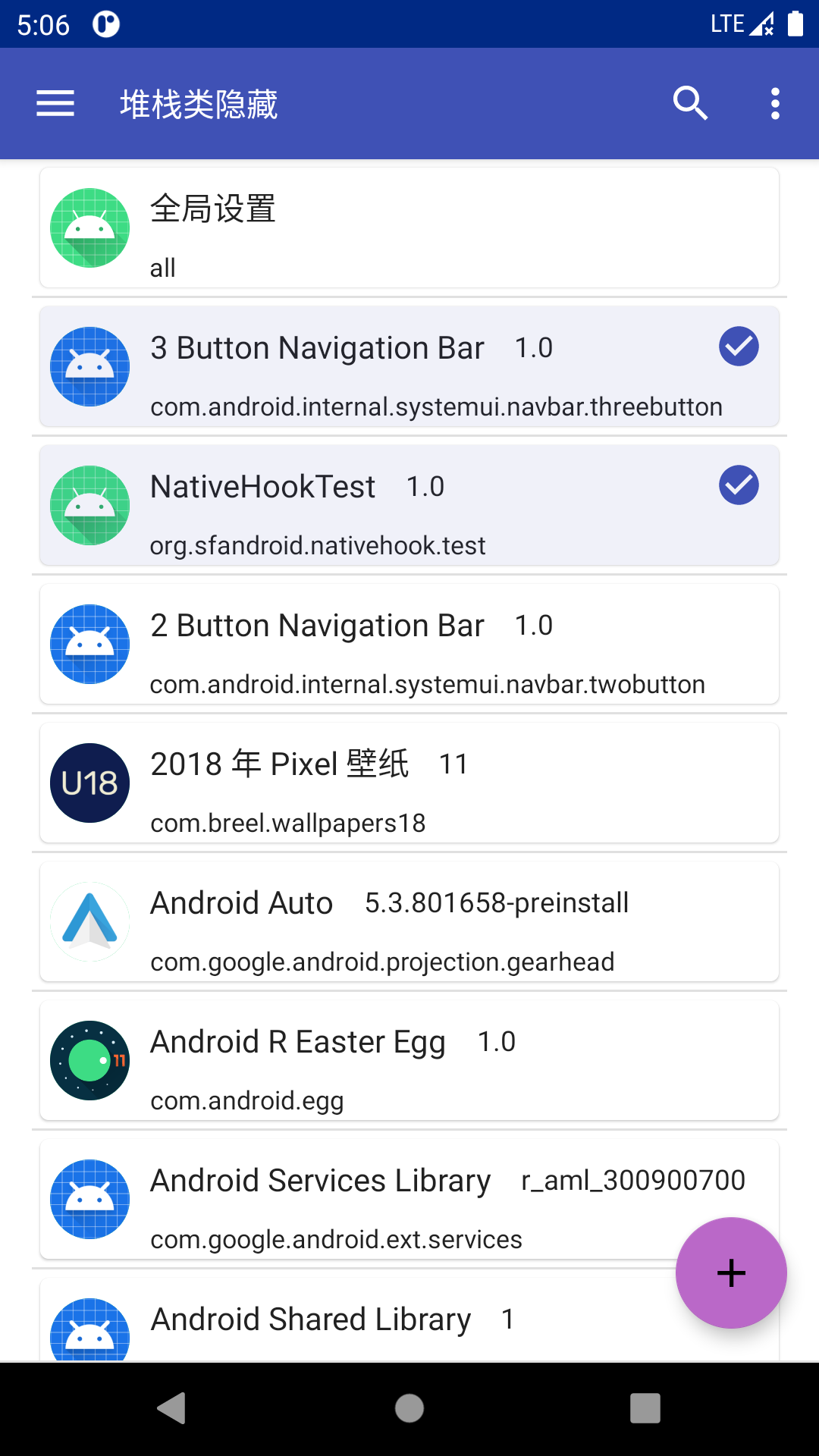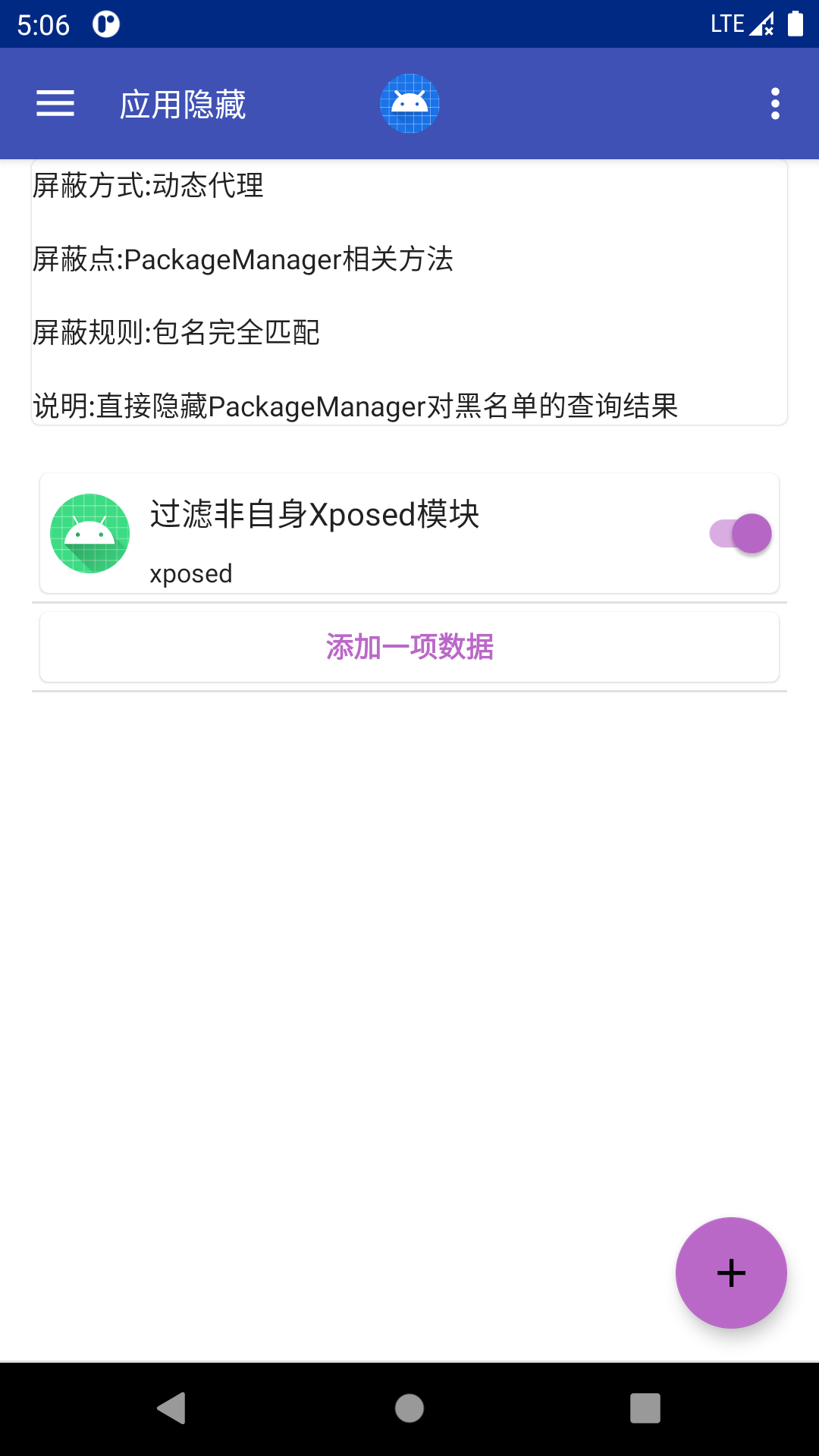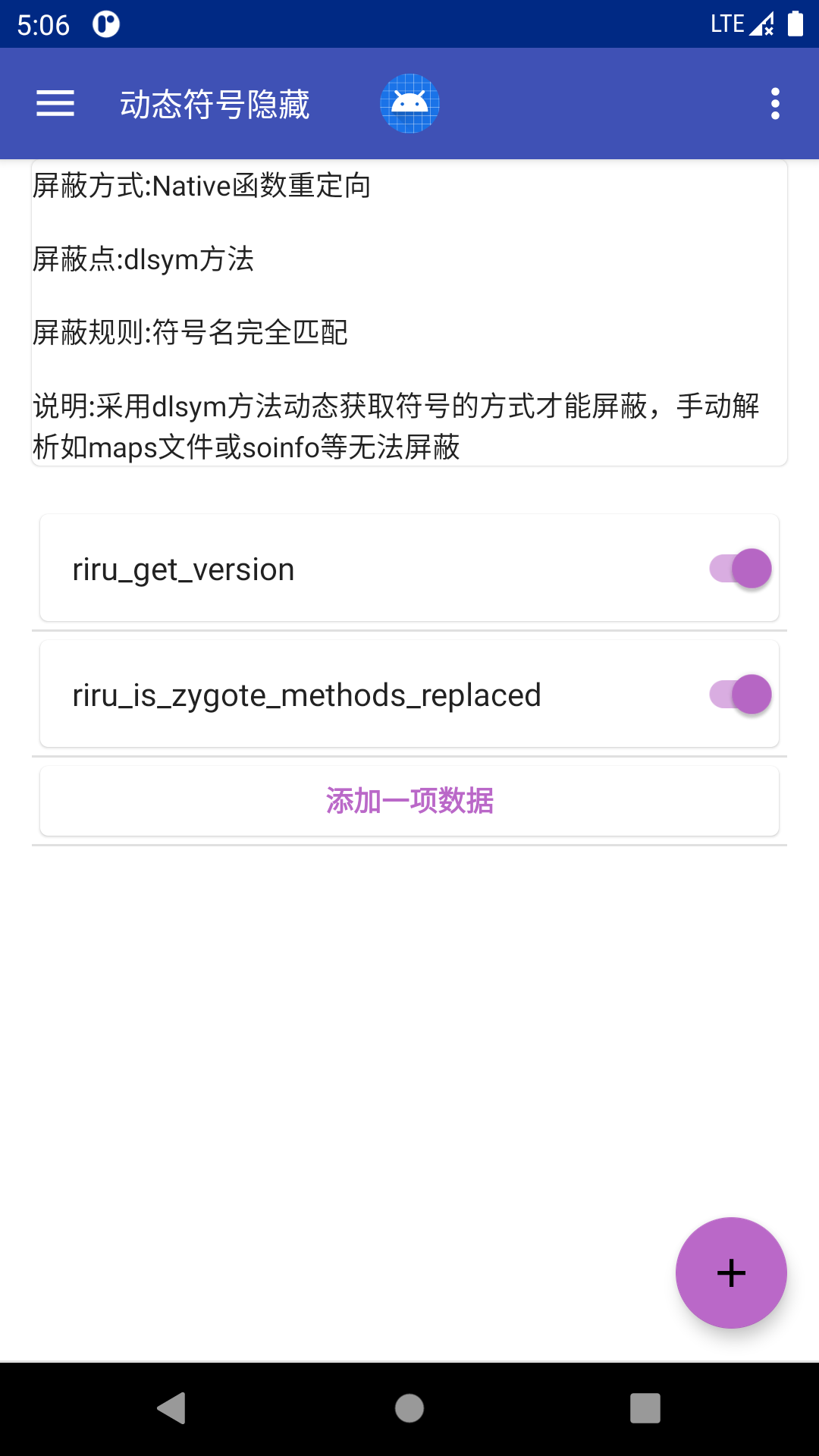FakeXposed
一个通用多功能的 Xposed 隐藏器,采用 Native 与 Java 结合来做到双向屏蔽检测,提供高度自由化为每个应用配置不同属性。它不仅仅局限于屏蔽 Xposed 检测,还提供更多更加高级的功能,如 maps 文件自定义屏蔽各种检测、完整的文件重定向功能、访问权限控制、JNI 方法监控、动态符号查找屏蔽 dlsym 等等,还可以提供给其它模块在进程内动态添加或修改配置。开源地址 https://github.com/sanfengAndroid/FakeXposed
原理简要介绍
Native Hook使用我的另一开源项目 fake-linker,Java Hook使用Xposed框架,大部分功能都是由Native Hook来完成,Xposed不限于原版Xposed、EdXposed、VirtualXposed等等- 内部提供
类、堆栈类、应用、环境变量、全局系统属性、Android Global属性、Runtime.exec拦截、文件访问/重定向等、符号拦截,各种属性的隐藏和修改,下面我将简单介绍一些原理,代码都是基于 Android 最新源码主分支,旧分支一些变化不是太大自行分析即可
类/堆栈类隐藏
- Hook
Class.forName()、ClassLoader.loadClass()、Throwable.getStackTrace()方法,判断隐藏类加载则抛出异常或删除该元素。目前我在测试EdXposed中只有部分情况会走该回调,可能框架处理了有关部分
应用/组件隐藏
- 使用动态代理
PackageManager、ActivityManager、ActivityTaskManager屏蔽常见会使用到获取其它应用属性的方法,如:getInstalledPackages、getInstalledApplications、getRunningServices、getTasks等等。应用进程本身就是通过Binder与system_server服务进程通信进程内只存在一个IBinger对象,因此非常适合使用动态代理,这里屏蔽掉几乎所有能够访问其它应用的方式,具体查看源码HookSystemComponent。 PackageManager源码在 ActivityThread.getPackageManager因此只需要使用反射修改1
2
3
4
5
6
7
8
9static volatile IPackageManager sPackageManager;
public static IPackageManager getPackageManager() {
if (sPackageManager != null) {
return sPackageManager;
}
final IBinder b = ServiceManager.getService("package");
sPackageManager = IPackageManager.Stub.asInterface(b);
return sPackageManager;
}sPackageManager静态变量即可ActivityManager源码AndroidO以上在 ActivityManager.IActivityManagerSingleton,AndroidO以下在ActivityManagerNative.gDefault,都是一个单例对象同样反射修改1
2
3
4
5
6
7
8
9private static final Singleton<IActivityManager> IActivityManagerSingleton =
new Singleton<IActivityManager>() {
protected IActivityManager create() {
final IBinder b = ServiceManager.getService(Context.ACTIVITY_SERVICE);
final IActivityManager am = IActivityManager.Stub.asInterface(b);
return am;
}
};Singleton里面的对象即可ActivityTaskManager是AndroidQ以上新增的一个服务,修改方法同ActivityManager
环境变量修改
Java调用System.getenv()、System.getenv(String)源码如下1
2
3
4
5
6
7
8
9
10
11
12
13
14
15public static java.util.Map<String,String> getenv() {
SecurityManager sm = getSecurityManager();
if (sm != null) {
sm.checkPermission(new RuntimePermission("getenv.*"));
}
return ProcessEnvironment.getenv();
}
public static String getenv(String name) {
if (name == null) {
throw new NullPointerException("name == null");
}
return Libcore.os.getenv(name);
}其最终调用两个函数
Libcore.os.environ()、Libcore.os.getenv(String)1
2
3
4
5
6
7
8
9
10
11
12
13public final class Libcore {
private Libcore() { }
public static final Os rawOs = new Linux();
public static volatile Os os = new BlockGuardOs(rawOs);
...
}
public final class Linux implements Os {
Linux() { }
public native String getenv(String name);
public native String[] environ();
...
}不同版本
Libcore.os的实现对象类名不一样,但是区别很小,而native中访问到是 libc 导出变量environ、导出函数getenv,因此通过Native Hook拦截getenv函数即可拦截对应 JavaSystem.getenv(String)调用,而System.getenv()调用是直接使用environ变量,因此暂时采用Java Hook替换该Map对象,通常情况下应用是很少使用到System.getenv非系统环境变量的,一些软件检测才会使用,因此后续可能会直接修改environ变量中的值
全局属性 SystemProperties 修改
Java反射使用SystemProperties.get系列方法1
2
3
4
5
6
7
8
9
10
public static String get( String key, String def) {
if (TRACK_KEY_ACCESS) onKeyAccess(key);
return native_get(key, def);
}
...
private static native String native_get(String key, String def);调用 android_os_SystemProperties.cpp 中的方法
1
2
3
4
5
6
7
8
9
10
11
12
13
14
15
16
17
18
19
20
21
22
23
24
25
26
27
28
29
30
31
32
33
34
35
36
37
38
39
40
41
42
43
44
45
46
47
48
49
50
51
52
53
54
55
56
57
58
59
60
61
62
63
64
65
66
67
68
69
70
71
72
73
74
75
76
77
78
79
80
81
82
83
84template<typename Functor>
void ReadProperty(const prop_info* prop, Functor&& functor)
{
auto thunk = [](void* cookie,
const char* /*name*/,
const char* value,
uint32_t /*serial*/) {
std::forward<Functor>(*static_cast<Functor*>(cookie))(value);
};
__system_property_read_callback(prop, thunk, &functor);
LOG(FATAL) << "fast property access supported only on device";
}
template<typename Functor>
void ReadProperty(JNIEnv* env, jstring keyJ, Functor&& functor)
{
ScopedUtfChars key(env, keyJ);
if (!key.c_str()) {
return;
}
const prop_info* prop = __system_property_find(key.c_str());
if (!prop) {
return;
}
ReadProperty(prop, std::forward<Functor>(functor));
std::forward<Functor>(functor)(
android::base::GetProperty(key.c_str(), "").c_str());
}
jstring SystemProperties_getSS(JNIEnv* env, jclass clazz, jstring keyJ,
jstring defJ)
{
jstring ret = defJ;
ReadProperty(env, keyJ, [&](const char* value) {
if (value[0]) {
ret = env->NewStringUTF(value);
}
});
if (ret == nullptr && !env->ExceptionCheck()) {
ret = env->NewStringUTF(""); // Legacy behavior
}
return ret;
}
int register_android_os_SystemProperties(JNIEnv *env)
{
const JNINativeMethod method_table[] = {
{ "native_get",
"(Ljava/lang/String;Ljava/lang/String;)Ljava/lang/String;",
(void*) SystemProperties_getSS },
{ "native_get_int", "(Ljava/lang/String;I)I",
(void*) SystemProperties_get_integral<jint> },
{ "native_get_long", "(Ljava/lang/String;J)J",
(void*) SystemProperties_get_integral<jlong> },
{ "native_get_boolean", "(Ljava/lang/String;Z)Z",
(void*) SystemProperties_get_boolean },
{ "native_find",
"(Ljava/lang/String;)J",
(void*) SystemProperties_find },
{ "native_get",
"(J)Ljava/lang/String;",
(void*) SystemProperties_getH },
{ "native_get_int", "(JI)I",
(void*) SystemProperties_get_integralH<jint> },
{ "native_get_long", "(JJ)J",
(void*) SystemProperties_get_integralH<jlong> },
{ "native_get_boolean", "(JZ)Z",
(void*) SystemProperties_get_booleanH },
{ "native_set", "(Ljava/lang/String;Ljava/lang/String;)V",
(void*) SystemProperties_set },
{ "native_add_change_callback", "()V",
(void*) SystemProperties_add_change_callback },
{ "native_report_sysprop_change", "()V",
(void*) SystemProperties_report_sysprop_change },
};
return RegisterMethodsOrDie(env, "android/os/SystemProperties",
method_table, NELEM(method_table));
}而它调用了
libc.so中的__system_property_find,__system_property_read_callback,在低版本中获取属性也使用到了__system_property_get方法,因此采用Native Hook以上这三个方法,这里也要注意不同版本在不同动态库中实现
Android Global 属性修改
- 采用 Java Hook
Global.getString方法修改
Runtime.exec 拦截
源码分析如下
1
2
3
4
5
6
7
8
9
10
11
12
13
14
15
16
17
18
19
20
21
22
23
24
25
26
27
28
29
30
31
32
33
34
35
36
37
38
39
40
41
42
43
44
45
46
47
48
49
50
51
52
53
54
55
56
57
58
59
60
61
62
63
64
65
66
67
68
69
70
71
72
73
74
75
76
77
78
79
80
81
82
83
84
85
86
87
88
89
90
91
92
93
94
95
96
97
98
99
100
101public class Runtime{
public Process exec(String[] cmdarray, String[] envp, File dir)
throws IOException {
return new ProcessBuilder(cmdarray)
.environment(envp)
.directory(dir)
.start();
}
}
public final class ProcessBuilder{
public Process start() throws IOException {
...
try {
return ProcessImpl.start(cmdarray,
environment,
dir,
redirects,
redirectErrorStream);
} catch (IOException | IllegalArgumentException e) {
...
}
}
final class ProcessImpl {
static Process start(String[] cmdarray,
java.util.Map<String,String> environment,
String dir,
ProcessBuilder.Redirect[] redirects,
boolean redirectErrorStream)
throws IOException
{
assert cmdarray != null && cmdarray.length > 0;
// Convert arguments to a contiguous block; it's easier to do
...
// 复制环境变量
FileInputStream f0 = null;
FileOutputStream f1 = null;
FileOutputStream f2 = null;
try {
if (redirects == null) {
std_fds = new int[] { -1, -1, -1 };
} else {
// 重定向流
...
}
return new UNIXProcess
(toCString(cmdarray[0]),
argBlock, args.length,
envBlock, envc[0],
toCString(dir),
std_fds,
redirectErrorStream);
} finally {
// In theory, close() can throw IOException
// (although it is rather unlikely to happen here)
try { if (f0 != null) f0.close(); }
finally {
try { if (f1 != null) f1.close(); }
finally { if (f2 != null) f2.close(); }
}
}
}
final class UNIXProcess extends Process {
private native int forkAndExec(byte[] prog,
byte[] argBlock, int argc,
byte[] envBlock, int envc,
byte[] dir,
int[] fds,
boolean redirectErrorStream)
throws IOException;
UNIXProcess(final byte[] prog,
final byte[] argBlock, final int argc,
final byte[] envBlock, final int envc,
final byte[] dir,
final int[] fds,
final boolean redirectErrorStream)
throws IOException {
pid = forkAndExec(prog,
argBlock, argc,
envBlock, envc,
dir,
fds,
redirectErrorStream);
try {
doPrivileged(new PrivilegedExceptionAction<Void>() {
public Void run() throws IOException {
initStreams(fds);
return null;
}});
} catch (PrivilegedActionException ex) {
throw (IOException) ex.getException();
}
}通过跟踪
Runtime.exec()->ProcessBuilder.start()->ProcessImpl.start()->new UNIXProcess()->UNIXProcess.forkAndExec()最终执行UNIXProcess.forkAndExec产生子进程,继续跟踪native1
2
3
4
5
6
7
8
9
10
11
12
13
14
15
16
17
18
19
20
21
22
23
24
25
26
27
28
29
30
31
32
33
34
35
36
37
38
39
40
41
42
43
44
45
46
47
48
49
50
51
52
53
54
55
56
57
58
59
60
61
62
63
64
65
66
67
68
69
70
71
72
73
74
JNIEXPORT jint JNICALL
UNIXProcess_forkAndExec(JNIEnv *env,
jobject process,
jbyteArray prog,
jbyteArray argBlock, jint argc,
jbyteArray envBlock, jint envc,
jbyteArray dir,
jintArray std_fds,
jboolean redirectErrorStream)
{
...
// 上面设置环境变量,重定向输入输出流
// startChild关键函数启动子进程
resultPid = startChild(c);
assert(resultPid != 0);
if (resultPid < 0) {
throwIOException(env, errno, START_CHILD_SYSTEM_CALL " failed");
goto Catch;
}
restartableClose(fail[1]); fail[1] = -1; /* See: WhyCantJohnnyExec */
switch (readFully(fail[0], &errnum, sizeof(errnum))) {
case 0: break; /* Exec succeeded */
case sizeof(errnum):
waitpid(resultPid, NULL, 0);
throwIOException(env, errnum, "Exec failed");
goto Catch;
default:
throwIOException(env, errno, "Read failed");
goto Catch;
}
fds[0] = (in [1] != -1) ? in [1] : -1;
fds[1] = (out[0] != -1) ? out[0] : -1;
fds[2] = (err[0] != -1) ? err[0] : -1;
Finally:
free(c->clone_stack);
/* Always clean up the child's side of the pipes */
closeSafely(in [0]);
closeSafely(out[1]);
closeSafely(err[1]);
/* Always clean up fail descriptors */
closeSafely(fail[0]);
closeSafely(fail[1]);
releaseBytes(env, prog, pprog);
releaseBytes(env, argBlock, pargBlock);
releaseBytes(env, envBlock, penvBlock);
releaseBytes(env, dir, c->pdir);
free(c->argv);
free(c->envv);
free(c);
if (fds != NULL)
(*env)->ReleaseIntArrayElements(env, std_fds, fds, 0);
return resultPid;
Catch:
/* Clean up the parent's side of the pipes in case of failure only */
closeSafely(in [1]);
closeSafely(out[0]);
closeSafely(err[0]);
goto Finally;
}最关键函数
startChild继续跟踪1
2
3
4
5
6
7
8
9
10
11
12
13
14
15
16
17
18
19
20
21
22
23
24
25
26
27
28
29
30
31
32
33
34
35
36
37
38
39
40static pid_t
startChild(ChildStuff *c) {
/*
* See clone(2).
* Instead of worrying about which direction the stack grows, just
* allocate twice as much and start the stack in the middle.
*/
if ((c->clone_stack = malloc(2 * START_CHILD_CLONE_STACK_SIZE)) == NULL)
/* errno will be set to ENOMEM */
return -1;
return clone(childProcess,
c->clone_stack + START_CHILD_CLONE_STACK_SIZE,
CLONE_VFORK | CLONE_VM | SIGCHLD, c);
/*
* We separate the call to vfork into a separate function to make
* very sure to keep stack of child from corrupting stack of parent,
* as suggested by the scary gcc warning:
* warning: variable 'foo' might be clobbered by 'longjmp' or 'vfork'
*/
volatile pid_t resultPid = vfork();
/*
* From Solaris fork(2): In Solaris 10, a call to fork() is
* identical to a call to fork1(); only the calling thread is
* replicated in the child process. This is the POSIX-specified
* behavior for fork().
*/
pid_t resultPid = fork();
if (resultPid == 0)
// 子进程处理对应命令
childProcess(c);
assert(resultPid != 0); /* childProcess never returns */
return resultPid;
}调用
clone、vfork、fork函数产生子进程然后调用childProcess(c)处理命令,这里使用哪一个函数产生子进程不是重点,我们关心的是子进程如何执行命令1
2
3
4
5
6
7
8
9
10
11
12
13
14
15
16
17
18
19
20
21
22
23
24
25
26
27
28
29
30
31
32
33
34
35
36
37
38
39
40
41
42
43
44
45
46
47
48
49
50
51
52
53
54
55
56
57
58
59
60
61
62
63
64
65
66
67
68
69
70
71
72
73
74
75
76
77
78
79
80
81
82
83
84
85
86
87
88
89
90
91
92
93
94
95
96
97
98
99
100
101
102
103
104
105
106
107
108
109
110
111
112
113
114
115
116
117
118
119
120
121
122
123
124
125
126
127
128
129
130
131
132
133
134
135
136
137
138
139
140
141
142
143
144
145
146
147
148
149
150
151
152
153
154
155
156
157
158
159
160
161
162
163static int
childProcess(void *arg)
{
const ChildStuff* p = (const ChildStuff*) arg;
/* Close the parent sides of the pipes.
Closing pipe fds here is redundant, since closeDescriptors()
would do it anyways, but a little paranoia is a good thing. */
if ((closeSafely(p->in[1]) == -1) ||
(closeSafely(p->out[0]) == -1) ||
(closeSafely(p->err[0]) == -1) ||
(closeSafely(p->fail[0]) == -1))
goto WhyCantJohnnyExec;
/* Give the child sides of the pipes the right fileno's. */
/* Note: it is possible for in[0] == 0 */
if ((moveDescriptor(p->in[0] != -1 ? p->in[0] : p->fds[0],
STDIN_FILENO) == -1) ||
(moveDescriptor(p->out[1]!= -1 ? p->out[1] : p->fds[1],
STDOUT_FILENO) == -1))
goto WhyCantJohnnyExec;
if (p->redirectErrorStream) {
if ((closeSafely(p->err[1]) == -1) ||
(restartableDup2(STDOUT_FILENO, STDERR_FILENO) == -1))
goto WhyCantJohnnyExec;
} else {
if (moveDescriptor(p->err[1] != -1 ? p->err[1] : p->fds[2],
STDERR_FILENO) == -1)
goto WhyCantJohnnyExec;
}
if (moveDescriptor(p->fail[1], FAIL_FILENO) == -1)
goto WhyCantJohnnyExec;
/* close everything */
if (closeDescriptors() == 0) { /* failed, close the old way */
int max_fd = (int)sysconf(_SC_OPEN_MAX);
int fd;
for (fd = FAIL_FILENO + 1; fd < max_fd; fd++)
if (restartableClose(fd) == -1 && errno != EBADF)
goto WhyCantJohnnyExec;
}
/* change to the new working directory */
if (p->pdir != NULL && chdir(p->pdir) < 0)
goto WhyCantJohnnyExec;
if (fcntl(FAIL_FILENO, F_SETFD, FD_CLOEXEC) == -1)
goto WhyCantJohnnyExec;
// 最终调用 JDK_execvpe 执行命令
JDK_execvpe(p->argv[0], p->argv, p->envv);
WhyCantJohnnyExec:
/* We used to go to an awful lot of trouble to predict whether the
* child would fail, but there is no reliable way to predict the
* success of an operation without *trying* it, and there's no way
* to try a chdir or exec in the parent. Instead, all we need is a
* way to communicate any failure back to the parent. Easy; we just
* send the errno back to the parent over a pipe in case of failure.
* The tricky thing is, how do we communicate the *success* of exec?
* We use FD_CLOEXEC together with the fact that a read() on a pipe
* yields EOF when the write ends (we have two of them!) are closed.
*/
{
int errnum = errno;
restartableWrite(FAIL_FILENO, &errnum, sizeof(errnum));
}
restartableClose(FAIL_FILENO);
_exit(-1);
return 0; /* Suppress warning "no return value from function" */
}
static void
JDK_execvpe(const char *file,
const char *argv[],
const char *const envp[])
{
if (envp == NULL || (char **) envp == environ) {
execvp(file, (char **) argv);
return;
}
if (*file == '\0') {
errno = ENOENT;
return;
}
if (strchr(file, '/') != NULL) {
execve_with_shell_fallback(file, argv, envp);
} else {
/* We must search PATH (parent's, not child's) */
char expanded_file[PATH_MAX];
int filelen = strlen(file);
int sticky_errno = 0;
const char * const * dirs;
for (dirs = parentPathv; *dirs; dirs++) {
const char * dir = *dirs;
int dirlen = strlen(dir);
if (filelen + dirlen + 1 >= PATH_MAX) {
errno = ENAMETOOLONG;
continue;
}
memcpy(expanded_file, dir, dirlen);
memcpy(expanded_file + dirlen, file, filelen);
expanded_file[dirlen + filelen] = '\0';
execve_with_shell_fallback(expanded_file, argv, envp);
/* There are 3 responses to various classes of errno:
* return immediately, continue (especially for ENOENT),
* or continue with "sticky" errno.
*
* From exec(3):
*
* If permission is denied for a file (the attempted
* execve returned EACCES), these functions will continue
* searching the rest of the search path. If no other
* file is found, however, they will return with the
* global variable errno set to EACCES.
*/
switch (errno) {
case EACCES:
sticky_errno = errno;
/* FALLTHRU */
case ENOENT:
case ENOTDIR:
case ELOOP:
case ESTALE:
case ENODEV:
case ETIMEDOUT:
break; /* Try other directories in PATH */
default:
return;
}
}
if (sticky_errno != 0)
errno = sticky_errno;
}
}
static void
execve_with_shell_fallback(const char *file,
const char *argv[],
const char *const envp[])
{
/* shared address space; be very careful. */
execve(file, (char **) argv, (char **) envp);
if (errno == ENOEXEC)
execve_as_traditional_shell_script(file, argv, envp);
/* unshared address space; we can mutate environ. */
environ = (char **) envp;
execvp(file, (char **) argv);
}通过上面分析,最终调用
JDK_execvpe->execve_with_shell_fallback->execve/execvp执行命令,实际测试执行Runtime.exec最终执行到execvp中。由于fork子进程后会继承父进程的环境,因此也可通过Native Hook来拦截该函数,但是实际测试中如果拦截execvp会导致子进程一直无法结束,从而导致卡住,这里原因暂时不明,有知道的可以留言告诉我。因此还是老实采用Java Hook更底层方法java.lang.UNIXProcess构造方法,对于低版本 Hookjava.lang.ProcessManager.exec方法。基于此提供命令,参数替换,以及固定输入、输出、错误流。具体源码查看 HookRuntime
文件重定向/访问控制(核心)
- 文件重定向/黑名单:
Native Hook与 IO 有关的方法,由于我们使用的PLT Hook因此要尽可能的包含全部函数- 如
openat、__openat、open、fopen等libc函数,Java中的File使用调用到Libcore.os中,这与上面分析环境变量类似,因此只需要Hooklibc 中的 IO 函数即可,查看代码hook_io。 syscall函数,自己实现软中断系统调用的无法拦截,其inline Hook框架也无法拦截,只能通过修改内核或动态查找软中断系统调用然后再 Hook,这种极个别情况忽略,查看代码 hook_syscallexec簇执行函数,它会传入可执行文件路径,也需要重定向,查看代码 hook_exec- 与时间相关函数
utimes、utime、lutimes,查看代码 hook_time - 与文件访问路径相关函数
chdir、linkat等,查看代码 hook_unistd - 与文件状态相关函数
fchmodat、fstatat、stat等,查看代码 hook_stat maps文件过滤,基于文件重定向,当要访问maps文件时将修改掉需要过滤的数据然后将它重定向到缓存路径,查看代码 io_redirect- 动态加载函数
dlopen、android_dlopen_ext,查看代码 hook_dlfcn
- 如
- 文件权限控制
statfstatat、access等函数,查看代码 hook_stat
符号隐藏
- Native Hook
dlsym函数,屏蔽一些符号查找和重定向libc库中的函数到Hook 模块中,查看代码 hook_dlfcn
系统共享库查找
- 上面 Hook 的
native方法都是libc中的导出方法,要让Native Hook生效我们则需要重定位那些已经加载过的动态库,其中系统中最主要使用的Libcore库,我们通过查找Android.bp(旧版本Android.mk)来查找共享库名称,如果没找到名称则目录一级一级的向上继续查找,下面与最新版Libcore为例,其它版本类似
如上面频繁使用的
libcore_io_Linux.cpp为例,源码路径在libcore/luni/src/main/native/libcore_io_Linux.cpp,它所属的编译模块Android.bp(libcore/luni/src/main/native/Android.bp),有关配置如下1
2
3
4
5
6
7
8
9
10
11
12
13
14
15
16
17
18
19
20
21
22
23
24
25
26
27
28
29
30
31
32
33
34
35
36
37
38
39
40
41
42
43
44
45
46
47
48package {
// http://go/android-license-faq
// A large-scale-change added 'default_applicable_licenses' to import
// the below license kinds from "libcore_luni_license":
// SPDX-license-identifier-Apache-2.0
default_applicable_licenses: ["libcore_luni_license"],
}
filegroup {
name: "luni_native_srcs",
visibility: [
"//libcore",
],
srcs: [
"ExecStrings.cpp",
"IcuUtilities.cpp",
"JniConstants.cpp",
"JniException.cpp",
"NetworkUtilities.cpp",
"Register.cpp",
"ZipUtilities.cpp",
"android_system_OsConstants.cpp",
"cbigint.cpp",
"java_lang_StringToReal.cpp",
"java_lang_invoke_MethodHandle.cpp",
"java_lang_invoke_VarHandle.cpp",
"libcore_math_NativeBN.cpp",
"libcore_icu_ICU.cpp",
"libcore_io_AsynchronousCloseMonitor.cpp",
// 这里包含我们需要拦截的源代码
"libcore_io_Linux.cpp",
"libcore_io_Memory.cpp",
"libcore_util_NativeAllocationRegistry.cpp",
"org_apache_harmony_xml_ExpatParser.cpp",
"sun_misc_Unsafe.cpp",
"valueOf.cpp",
],
}
filegroup {
name: "libandroidio_srcs",
visibility: [
"//libcore",
],
srcs: [
"AsynchronousCloseMonitor.cpp",
],
}这里没有找到模块名称,则继续向上级目录查找编译脚本,上层找到
libcore/luni/Android.bp,配置如下1
2
3
4
5
6
7
8
9
10
11
12
13
14
15
16package {
default_applicable_licenses: ["libcore_luni_license"],
}
// Added automatically by a large-scale-change
// http://go/android-license-faq
license {
name: "libcore_luni_license",
visibility: [":__subpackages__"],
license_kinds: [
"SPDX-license-identifier-Apache-2.0",
],
license_text: [
"license.html",
],
}还是没找到名称继续往上查找
libcore/Android.bp1
2
3
4
5
6
7
8
9
10
11
12
13
14
15
16
17
18
19
20
21
22
23
24
25
26
27
28
29
30
31
32
33
34
35
36
37
38
39
40
41
42
43
44
45
46
47
48
49
50
51license {
name: "libcore_license",
visibility: [":__subpackages__"],
license_kinds: [
"SPDX-license-identifier-Apache-2.0",
"SPDX-license-identifier-BSD",
"SPDX-license-identifier-GPL",
"SPDX-license-identifier-GPL-2.0",
"SPDX-license-identifier-LGPL",
"SPDX-license-identifier-MIT",
"SPDX-license-identifier-OpenSSL",
"SPDX-license-identifier-Unicode-DFS",
"SPDX-license-identifier-W3C",
"legacy_unencumbered",
],
license_text: [
"LICENSE",
"NOTICE",
],
}
build = [
"JavaLibrary.bp",
// 这里有两个编译脚本
"NativeCode.bp",
]
genrule {
name: "notices-for-framework-stubs-gen",
tool_files: [
"NOTICE",
"ojluni/NOTICE",
],
cmd: "cp -f $(location NOTICE) $(genDir)/NOTICES/libcore-NOTICE && cp -f $(location ojluni/NOTICE) $(genDir)/NOTICES/ojluni-NOTICE",
out: [
"NOTICES/libcore-NOTICE",
"NOTICES/ojluni-NOTICE",
],
}
java_library {
name: "art-notices-for-framework-stubs-jar",
visibility: [
"//art/build/sdk",
"//frameworks/base",
],
java_resources: [
":notices-for-framework-stubs-gen",
],
sdk_version: "core_current",
}查看
NativeCode.bp1
2
3
4
5
6
7
8
9
10
11
12
13
14
15
16
17
18
19
20
21
22
23
24
25
26
27
28
29cc_library_shared {
name: "libjavacore",
visibility: [
"//art/build/apex",
],
apex_available: [
"com.android.art",
"com.android.art.debug",
],
defaults: [
"core_native_default_flags",
"core_native_default_libs",
],
srcs: [
":luni_native_srcs",
],
shared_libs: [
"libandroidio",
"libbase",
"libcrypto",
"libicu",
"libexpat",
"libnativehelper",
"libz",
],
static_libs: [
"libziparchive",
],
}最终找到该名称为
libjavacore.so
根据代码位置猜测,或者直接在
maps文件里面查找哪些已经加载的可疑的库,目前查找到系统有关的库包含如下几个libjavacore.so与文件重定向、文件状态、exec 执行有关libnativehelper.so与动态加载有关libnativeloader.soAndroid 7 以上动态加载有关libart.so与文件重定向、动态加载有关libopenjdk.so与文件重定向、文件状态有关libopenjdkjvm.so与文件访问有关libandroid_runtime.so与文件访问有关libcutils.so与 SystemProperties 访问有关
如果有遗漏的库可以调用
NativeHook.relinkLibrary()重新重定位该库
其它模块调用
查看 FakeXposed 说明文档
软件使用截图
- 软件状态
![home]()
- 应用配置,长按开启/关闭
![package_configuration]()
- 对应功能配置
![package_hidden]()
![dlsym_hidden]()







